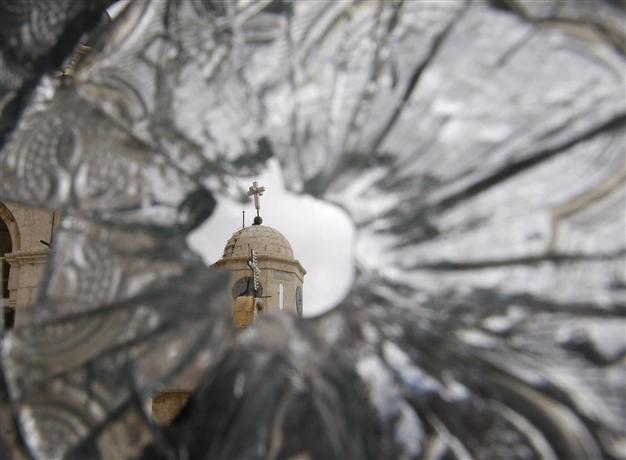First clashes hit Christian areas of Syria capital
DAMASCUS - Agence France-Presse

In this January 31, 2012, file photo taken during a government-organized tour for the media, a church dome is seen through a broken window of the Sednaya Convent, which was damaged by artillery fire in Sednaya, north of Damascus, Syria AP Photo
Fierce fighting between Syrian rebels and the army erupted on Wednesday near two Christian areas of Damascus for the first time in the nearly 17-month uprising, as the battle for Aleppo entered its fifth day.President Bashar al-Assad said the army was waging a "heroic" battle against the enemy and the country was engaged in a "crucial battle for its destiny." As rebels and troops battled in Damascus and Aleppo, exiled opposition leaders bickered over strategy, with a prominent dissident announcing he had been tasked to form a government in exile, drawing criticism from the main opposition bloc.
A firefight erupted early Wednesday on the outskirts of Damascus' Bab Tuma and Bab Sharqi areas, two traditional Christian districts of Damascus, the Syrian Observatory for Human Rights said.
"First indications are that one soldier has been killed," the Britain-based group said.
"This is fighting in areas where it has not happened before. These are areas where the rebels have so far not had access," Observatory chief Rami Abdel rahman told AFP.
One witness said rebels attacked a military position outside Bab Sharqi at 4:00 am (0100 GMT) in a clash that lasted for 15 minutes. An AFP correspondent said calm later returned to the area.
Bab Tuma and Bab Sharqi in the Old City of Damascus were previously popular with tourists and were the scene of several pro-regime protests in the past.
Earlier the Local Coordination Committees (LCC) that organises protests on the ground, reported a blast and heavy gunfire from Baghdad Street, a main arterial route through the city.
The LCC also said that the capital's southern suburb of Tadamun was hit by mortar fire at dawn.
Since July 20, the battle between the rebels and government forces had focused on the country's commercial capital Aleppo in the north.
There were bombings during the night northwest of Aleppo, while heavy machinegun fire and Grad rocket fire were also reported in the area.
"The army and the terrorist groups have both sent reinforcements for a decisive battle that should last several weeks" in Aleppo, a Damascus security source told AFP.
The rebels sent in backup from nearby Turkey after seizing a strategic checkpoint just outside Aleppo.
"The Syrian army is surrounding rebel districts, and is bombing them, but it is going to take its time before it launches its assault on each neighbourhood," the security source said.
The Observatory said fighting on Tuesday in Aleppo was the fiercest so far in a contest that state media had billed as the "mother of all battles." "Hundreds of rebels attacked the police stations in Salhin and Bab al-Nayrab (neighbourhoods) and at least 40 policemen were killed during the fighting, which lasted for hours," Abdel Rahman said.
They later seized a third police station in Hanano, the Britain-based Observatory said.
On Tuesday 124 people were killed nationwide -- 35 civilians, 62 soldiers and 27 rebels -- around half of them in Aleppo.
The pro-regime Al-Watan newspaper said on Wednesday that "the army has tightened the noose around the terrorists in the neighborhoods of Aleppo."
'Disturbing pattern of abuses'
Amnesty International accused regime forces of conducting a brutal crackdown against dissidents in Aleppo.
"The current onslaught on the city of Aleppo -- which puts civilians even more at grave risk -- is a predictable development which follows the disturbing pattern of abuses by state forces across the country," said Amnesty's Donatella Rovera in a report on the Syrian crisis.
Activists posted a video on YouTube purportedly showing members of the rebel Free Syrian Army executing regime loyalists in Aleppo.
The victims were from the Al-Berri tribe, which has long supported regime forces in violent crackdowns on demonstrations in Aleppo, Abdel Rahman said, but added that "this is criminal. This is revenge." The troubled UN observer mission in Syria, deployed to monitor a putative ceasefire, said the army was using helicopters, tanks and artillery against rebels who seized large swathes of the city in an offensive launched on July 20.
It appealed to both sides to protect civilians as the International Committee of the Red Cross reported that 200,000 people had fled the Aleppo area amid "continuous raging violence." Veteran dissident Haytham al-Maleh told reporters he had been tasked with forming a government in exile based in Cairo, an announcement the opposition Syrian National Council called premature.
"I have been tasked with leading a transitional government," Maleh said, adding that he would begin consultations "with the opposition inside and outside" Syria.
Maleh, a conservative Muslim, said he was named by a Syrian coalition of "independents with no political affiliation." When Assad falls, "we don't want to find ourselves in a political or administrative vacuum," said the 81-year-old rights activist who has been jailed twice under the Assad regime.
But SNC chief Abdel Basset Sayda chief said it was a "hasty decision" by Maleh.
"We wish it had not happened," he told AFP. "It actually weakens the opposition."
















